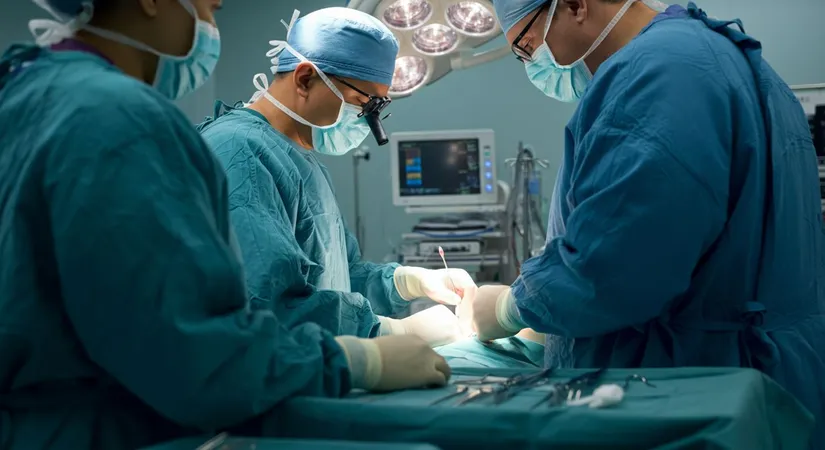Discover the Power of Gastric Bypass Surgery
Gain insights into how gastric bypass surgery can transform your weight loss journey and lead to a healthier life.
Gastric bypass surgery stands as one of the most transformative interventions for individuals battling obesity. By significantly reducing the stomach size and rerouting the digestive system, it facilitates rapid and substantial weight loss. This surgery has grown in popularity due to its efficiency and the profound impact it has on patients' lives. In this comprehensive guide, we will explore the many facets of gastric bypass surgery, from understanding the surgical process to preparing for surgery and navigating the recovery phase. We aim to provide a detailed perspective that aids potential candidates in making informed decisions for a healthier future.
Understanding Gastric Bypass: A Comprehensive Guide
Exploring the Benefits of Gastric Bypass Surgery
Gastric bypass surgery offers numerous benefits beyond weight loss. One significant advantage is the improvement in obesity-related health conditions. For instance, many patients experience a reduction in type 2 diabetes symptoms, often achieving remission. Additionally, this surgery can lead to lower blood pressure, reducing the risk of heart disease.
Another benefit is the positive impact on mental health. As individuals lose weight, they often report enhanced self-esteem and a better quality of life. This psychological boost can be crucial in maintaining long-term weight management. Furthermore, gastric bypass surgery can lead to increased mobility, allowing individuals to engage in physical activities they previously found challenging.
Key Benefits of Gastric Bypass Surgery
- Improvement in type 2 diabetes symptoms, often leading to remission.
- Reduction in hypertension, decreasing heart disease risk.
- Enhanced self-esteem and quality of life.
These benefits highlight the comprehensive impact of gastric bypass surgery, making it a valuable option for those struggling with severe obesity and related health issues.
Steps to Prepare for Gastric Bypass Surgery
- Consult with a qualified bariatric surgeon to assess suitability.
- Undergo necessary medical evaluations and psychological assessments.
- Adopt pre-surgery lifestyle changes, including dietary adjustments and exercise.
Proper preparation is essential to ensure a successful surgery and recovery. By following these steps, patients can enhance their readiness for the procedure and improve their post-operative outcomes.

How Gastric Bypass Surgery Aids Weight Loss
Understanding the Hormonal Changes Post-Surgery
Gastric bypass surgery significantly impacts weight loss through hormonal changes. Post-surgery, patients experience a reduction in ghrelin, the hunger hormone, which diminishes appetite and enhances satiety. This hormonal shift is crucial for long-term weight management and helps patients maintain their new weight.
Additionally, the surgery boosts the production of hormones like GLP-1, which improves insulin sensitivity. This change is particularly beneficial for individuals with type 2 diabetes, as it aids in better blood sugar control. The hormonal adjustments also contribute to a faster metabolism, further supporting weight loss efforts.
Key Hormonal Changes After Gastric Bypass
- Decrease in ghrelin levels, reducing hunger and increasing satiety.
- Increase in GLP-1, enhancing insulin sensitivity and metabolic health.
- Boost in metabolism, aiding in sustained weight loss.
These hormonal changes are instrumental in the success of gastric bypass surgery, making it an effective tool for combating obesity and its related health issues.
Steps to Maximize Post-Surgery Weight Loss
- Follow a balanced diet rich in proteins and low in sugars.
- Engage in regular physical activity to enhance metabolic rate.
- Attend follow-up appointments to monitor progress and adjust plans.
By adhering to these steps, patients can optimize their weight loss results and improve their overall health post-surgery.

Preparing for Your Gastric Bypass Journey
Essential Lifestyle Changes Before Surgery
Preparing for gastric bypass surgery involves significant lifestyle changes to ensure optimal outcomes. Quitting smoking is crucial, as it enhances healing and reduces surgical risks. Additionally, limiting alcohol intake is advised to prevent complications and support recovery.
Nutritional counseling is a vital component of preparation. Patients learn to adopt a balanced diet, focusing on nutrient-rich foods that will support their new lifestyle post-surgery. This often includes increasing protein intake and reducing sugars and fats.
Key Lifestyle Adjustments for Success
- Quit smoking to improve healing and reduce risks.
- Limit alcohol to prevent complications and support recovery.
- Adopt a balanced diet with increased protein and reduced sugars.
These adjustments are foundational for a successful gastric bypass journey, aiding in both immediate recovery and long-term health improvements.
Understanding the Financial Aspects of Gastric Bypass
- Discuss insurance coverage with your healthcare provider.
- Consider potential additional healthcare needs post-surgery.
- Plan financially for any out-of-pocket expenses.
Understanding the financial aspects of gastric bypass surgery is essential for effective planning. Engaging with healthcare providers about insurance and potential costs helps ensure a smooth journey.

Recovery and Life After Gastric Bypass Surgery
Adapting to Dietary Changes Post-Surgery
After gastric bypass surgery, patients must navigate significant dietary changes to ensure successful recovery. Initially, the diet consists of liquids, gradually transitioning to pureed foods, and eventually to solid foods. This phased approach helps the stomach heal and adapt to its new size.
Patients are encouraged to focus on protein-rich foods to support healing and maintain muscle mass. For example, incorporating lean meats, eggs, and dairy products can provide essential nutrients. Additionally, staying hydrated is crucial, but patients should avoid drinking fluids during meals to prevent overfilling the stomach.
Key Dietary Guidelines for Recovery
- Start with liquids, then progress to pureed and solid foods.
- Prioritize protein-rich foods like lean meats and dairy.
- Avoid drinking fluids during meals to prevent discomfort.
Adhering to these dietary guidelines is essential for a smooth recovery and helps establish healthy eating habits for long-term success.
Steps to Embrace a New Lifestyle
- Incorporate regular physical activity to enhance weight loss and improve fitness.
- Attend follow-up appointments to monitor health and adjust dietary plans.
- Engage in support groups or counseling to address emotional and psychological changes.
Embracing these lifestyle changes is crucial for maintaining weight loss and overall well-being after gastric bypass surgery. Regular physical activity not only aids in weight management but also boosts mood and energy levels. Additionally, ongoing medical follow-up ensures that any potential complications are promptly addressed, while support groups provide a platform for sharing experiences and receiving encouragement.
Comprehensive Gastric Bypass Surgery Techniques
Effective Recovery and Lifestyle Integration Post-Surgery
Frequently Asked Questions
What is gastric bypass surgery and how does it aid in weight loss?
What are the key benefits of undergoing gastric bypass surgery?
How should one prepare for gastric bypass surgery?
What is the recovery process like after gastric bypass surgery?
What are the hormonal changes that occur after gastric bypass surgery?
Discover the Path to Healthy Beauty with estethica's Expert Care!
📞 Call Now for Your Free Consultation!